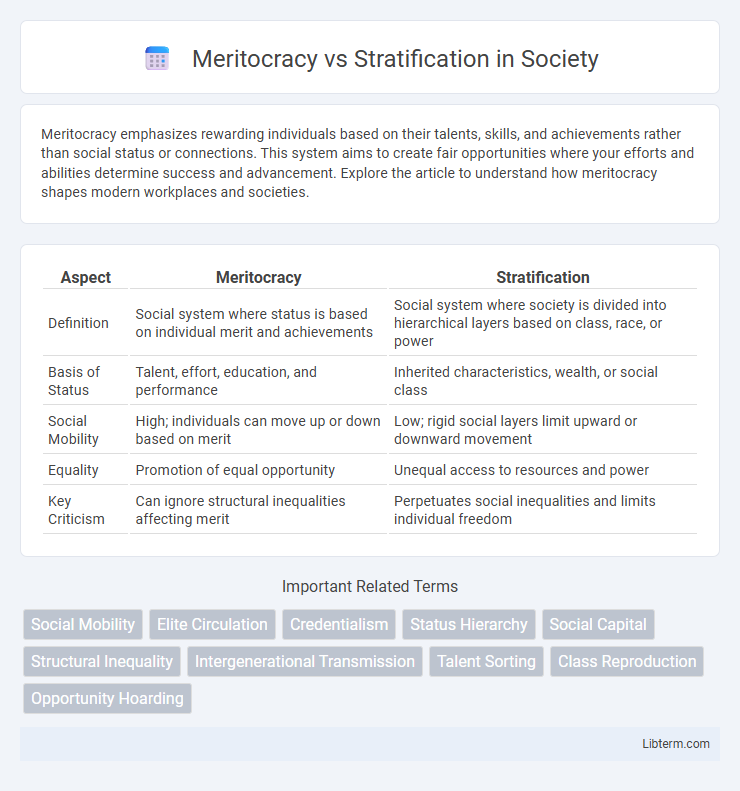Meritocracy emphasizes rewarding individuals based on their talents, skills, and achievements rather than social status or connections. This system aims to create fair opportunities where your efforts and abilities determine success and advancement. Explore the article to understand how meritocracy shapes modern workplaces and societies.
Table of Comparison
| Aspect | Meritocracy | Stratification |
|---|---|---|
| Definition | Social system where status is based on individual merit and achievements | Social system where society is divided into hierarchical layers based on class, race, or power |
| Basis of Status | Talent, effort, education, and performance | Inherited characteristics, wealth, or social class |
| Social Mobility | High; individuals can move up or down based on merit | Low; rigid social layers limit upward or downward movement |
| Equality | Promotion of equal opportunity | Unequal access to resources and power |
| Key Criticism | Can ignore structural inequalities affecting merit | Perpetuates social inequalities and limits individual freedom |
Defining Meritocracy: Principles and Practices
Meritocracy is a social system where individuals advance based on their abilities, talent, and achievements rather than their social status or wealth, emphasizing fairness and equal opportunity. Key principles include performance-based rewards, objective evaluations, and the promotion of skills and education to ensure that success reflects individual merit. In practice, meritocracy aims to reduce inherited privilege and encourage innovation by enabling talented individuals to rise through competence and hard work.
Understanding Social Stratification: Layers of Society
Social stratification organizes society into hierarchical layers based on factors such as wealth, power, and prestige, creating distinct social classes that influence individuals' life chances and access to resources. Meritocracy emphasizes achievement and individual talent as the basis for social mobility, yet stratification highlights persistent inequalities shaped by birth and social background. Understanding social stratification reveals how systemic barriers limit upward mobility despite meritocratic ideals, reinforcing social divisions and structural disparities.
Historical Origins of Meritocracy and Stratification
Meritocracy originated in early 20th-century sociological theories emphasizing individual ability and achievement as determinants of social status, contrasting sharply with the rigid class structures of earlier societies. Stratification, with roots tracing back to ancient civilizations, reflects hierarchical systems based on birthright, wealth, or social class that restrict social mobility. Understanding these historical origins reveals how meritocratic ideals emerged to challenge established stratified orders, influencing modern social and organizational structures.
Benefits of Merit-Based Systems
Merit-based systems enhance social mobility by rewarding individual talent, effort, and achievements, leading to a more efficient allocation of resources and skills. These systems encourage innovation and motivation, as people strive for success based on measurable performance rather than inherited status or social class. By promoting fairness and equal opportunity, meritocracy reduces social inequality and fosters a dynamic, competitive environment that benefits economic growth and societal development.
Criticisms of Meritocracy in Modern Societies
Meritocracy faces criticism for perpetuating social inequalities by privileging those with access to better education and resources, rather than purely rewarding talent and effort. Studies show that inherited wealth and social capital heavily influence career success, undermining the ideal of equal opportunity. Critics argue that meritocracy often masks systemic stratification, reinforcing existing power structures and limiting social mobility for marginalized groups.
How Stratification Shapes Opportunity and Mobility
Social stratification creates structured inequalities that limit access to resources and opportunities, reinforcing hierarchical layers in society. Individuals born into lower strata face significant barriers to upward mobility due to disparities in education, wealth, and social capital. This systemic division contrasts with meritocracy, where advancement is ideally based on individual talent and effort rather than inherited status or social class.
Inequality: The Overlap Between Meritocracy and Stratification
Meritocracy and stratification both shape social inequality by influencing access to resources and opportunities, yet they differ in how these systems justify disparities. Meritocracy promotes the idea that individual talent and effort determine social ranking, while stratification often relies on inherited status and systemic barriers. The overlap occurs when meritocratic ideals mask entrenched stratification, perpetuating inequality under the guise of fairness.
Case Studies: Global Perspectives on Merit and Class
Case studies from countries like Sweden and India reveal how meritocracy and social stratification interact uniquely within different cultural and economic contexts. In Sweden, policies emphasize equal access to education and social mobility, supporting meritocratic ideals despite existing class divisions. In contrast, India's caste system illustrates entrenched stratification where meritocracy is often limited by historical and social barriers, complicating efforts to achieve equal opportunity across classes.
Policy Approaches to Reducing Social Stratification
Policy approaches to reducing social stratification emphasize meritocratic principles by promoting equal access to quality education, fair labor market opportunities, and progressive taxation systems. Affirmative action and targeted social programs aim to dismantle structural barriers that perpetuate inequality, enabling social mobility based on individual talent and effort. Effective policies prioritize inclusivity and resource redistribution to counteract entrenched social hierarchies and enhance socioeconomic equity.
The Future of Meritocracy in an Increasingly Stratified World
The future of meritocracy faces significant challenges in an increasingly stratified world where economic and social inequalities limit equal access to opportunities. As wealth and privilege concentrate within certain social strata, merit-based systems risk reinforcing existing hierarchies rather than promoting genuine social mobility. Addressing systemic barriers and ensuring equitable resource distribution remain crucial to preserving the integrity of meritocratic principles in contemporary society.
Meritocracy Infographic

 libterm.com
libterm.com